The Tamil Academic Journal has launched its first conference focusing on “Tamil Resistance in the 21st Century” at Kingston University on July 6.
The conference held a variety of lectures from prominent academics on issues ranging from academic freedom; caste discrimination; the colonisation of the North and East of Sri Lanka; Tamil Linguistics in Singapore; and, Tamil identity across the diaspora and homeland. There was also a panel discussion on “The opportunities and challenges of bringing about Truth, Accountability, and Justice in the Island of Sri Lanka” as well as another reflecting on “Directions for impact-driven academic research and publishing”.
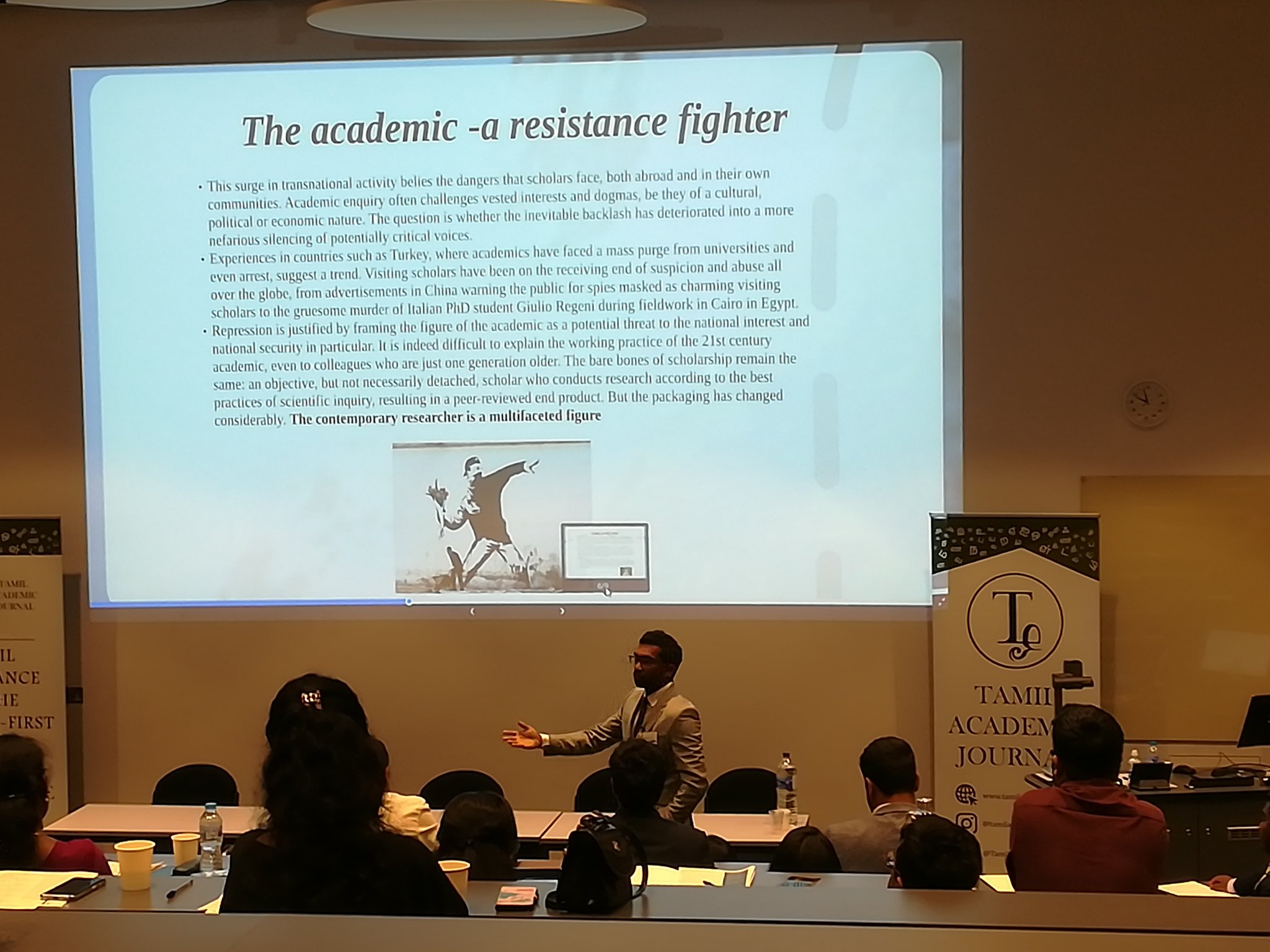
Thamil Ananathavinyagan, professor of law at Griffith College Dublin and author of "Sri Lanka, Human Rights, and the United Nations" opened the conference situating the issues of academic freedom in Sri Lanka within a broader history and vision. He maintains that academic freedom is being challenged across the world by an increasingly brazen far right. He further states:
“After generations of European colonisation, Tamils find themselves internally colonised and subject to their will.
It is through channeling their struggle through academic resistance to hegemonic narratives that we are to establish a global consciousness.
We as Tamils have learned from the position being born is a position of resistance and must channel it through academic resistance”
Ananathavinyagan’s discussion was shortly followed by a panel discussion on "The opportunities and challenges of bringing about Truth, Accountability, and Justice in the Island of Sri Lanka”. Anathavinayagan spoke with Dr. Madura Rasaratnam, a professor of comparative politics at City University, Ms. Dharsha Jegatheeswaran, Research Director Adayaalam Centre for Policy Research and Ms. Dushyanthy Pillai, a doctoral student at King’s College London.
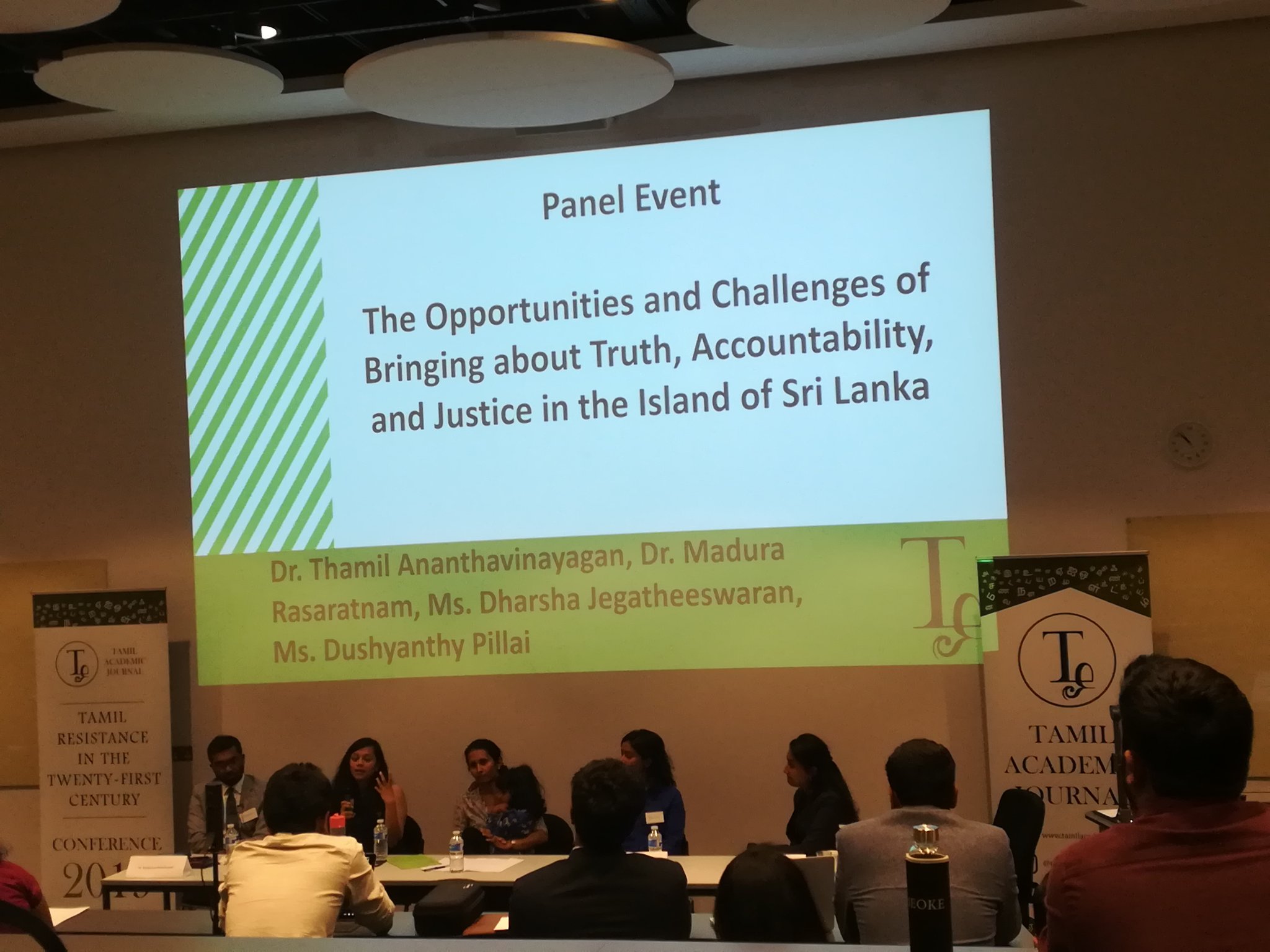
Ananathavinyagan began the discussion by situation Sri Lanka’s human rights situation within an international context, detailing the stagnation of the UN and the withdrawal of US scrutiny since the Trump administration.
The “Trump's presidency has seen the withdrawal of the US from the human rights council. Coupled with China and Russia, rising power who are committed to protecting Sri Lanka from accountability. This has caused a loss of momentum.”
Dushyanthy Pillai praised the international diaspora stating that it had “proven effective in pushing the human rights agenda”. This sentiment was shared with Dr. Madura Rasaratnam who maintained that “Tamil activists have been effective in pushing Britain's political parties to take action on Sri Lanka human rights record”.
She further maintained that:
“the UN is not a court of law it is a political institution, a site of political struggle. It is not the only site of resistance and we should explore other avenues”.
These other avenues include the principle of universal jurisdiction and civil suits such as ITJP’s case against Gotabaya.
Read more here: US lawsuits filed against Gotabaya Rajapaksa
Dr. Madura Rasaratnam further cautioned against the deterministic analysis of geo-politics.
“The world is in flux and Sri Lanka is seen as central due to its harbors. This geopolitical concern has caused great dismay.
But as the panel is titled there are always opportunities.
Remember Sri Lanka strongest backers were western states and India [not China]
Sri Lanka isn't central to global politics”.
The panel was then followed by Malcolm Rodgers discussion of his paper on "The Victors and the Spoils: Militarisation and Colonisation in Contemporary North and East of Sri Lanka".
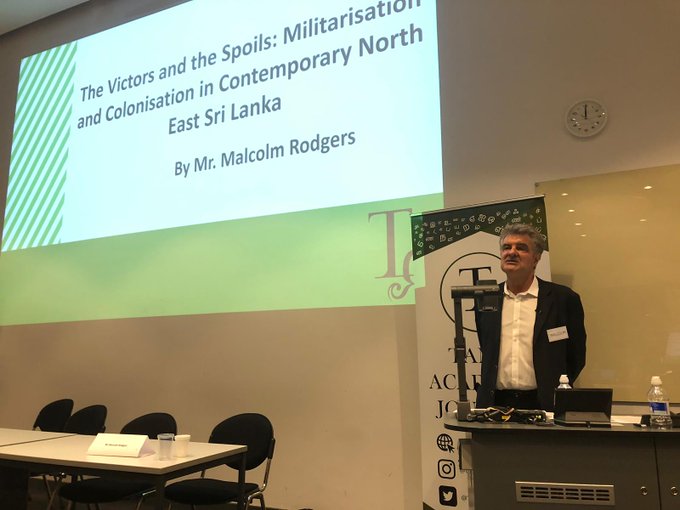
Rodger’s lecturer makes the case for structural similarities between both Tamil and Palestinian oppression, as both are cases of an occupied military presence and colonisation.
Rodger’s notes that:
“The military is making annual profits of 5 million us dollars in the north and east. This is money taken from the pockets of subsistence farmers.
This is an example of the extractive process. It is a punitive act. People are punished for willingly of unwillingly taking part in the war.
There is a strong element of retribution if not revenge here”.
Rodger states that thousands of northern Tamils are displaced from their land due to the annexation of land which has been sponsored by the government. This is further aided through the rediscovery of “Buddhist artifacts and sites” through archeology departments; the aim of which is to rewrite Sri Lanka’s history.
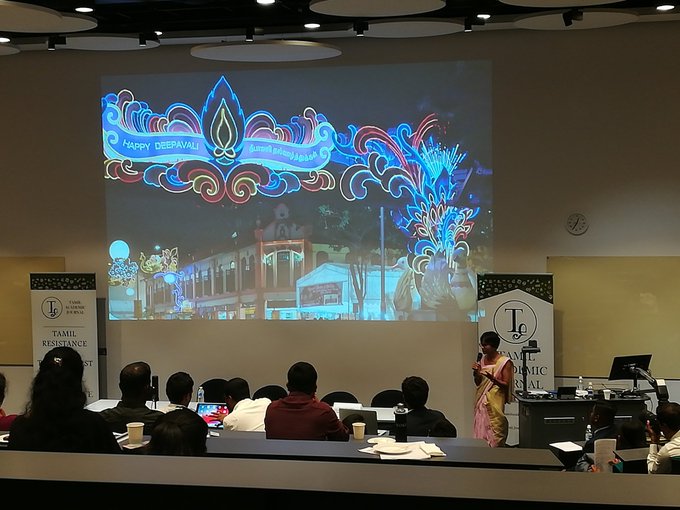
Davini Laksmi, a recent graduate from the National University of Singapore, presented her work on "The place of Tamil in the Linguistic Landscape of Singapore's Little India”.
Here she noted the unusual situation in which Tamil is promoted and commodified to sell Little India’s authenticity whilst failing to recognise other Indian languages. Her work touches upon the complex relationship between the state and national languages.
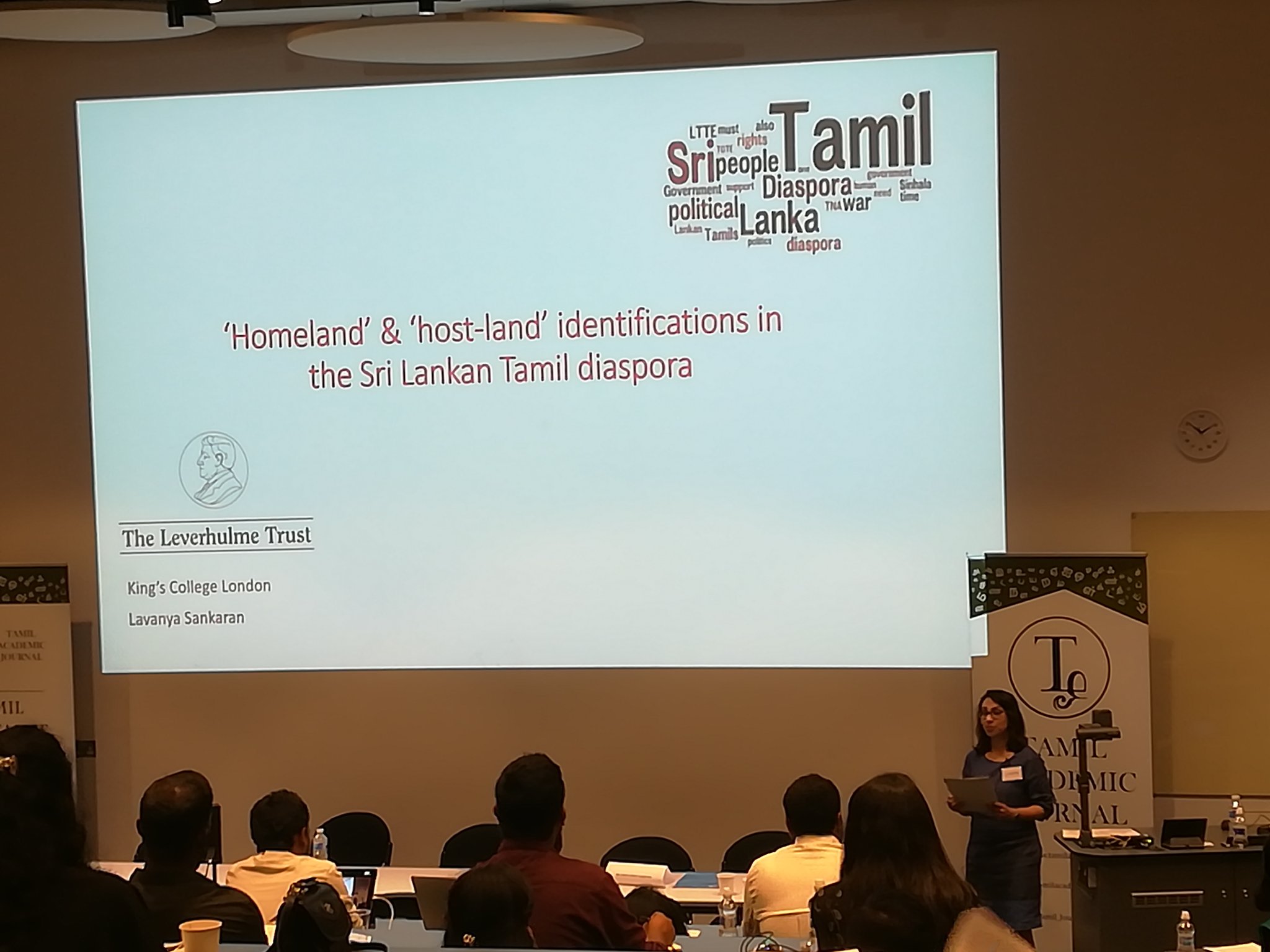
Dr. Lavanya Sankaran, a lecturer at King's College London, is presented her work on, “’ Homeland’ and ‘host-land’ identifications in the Sri Lankan Tamil diaspora”. Here she identifies how Tamil identity has evolved within the diaspora as well as the homeland where Tamil communities have been subject to greater policing. She maintains that there is a complex relationship between terms such as “homeland" and "host land" need to be reinterrogated.
The final paper presented was Dr. Thanges Paramsothy on “Oppressed Castes in Jaffna: Shifting from Collective resistance to multiple invisible forms against caste discrimination”.
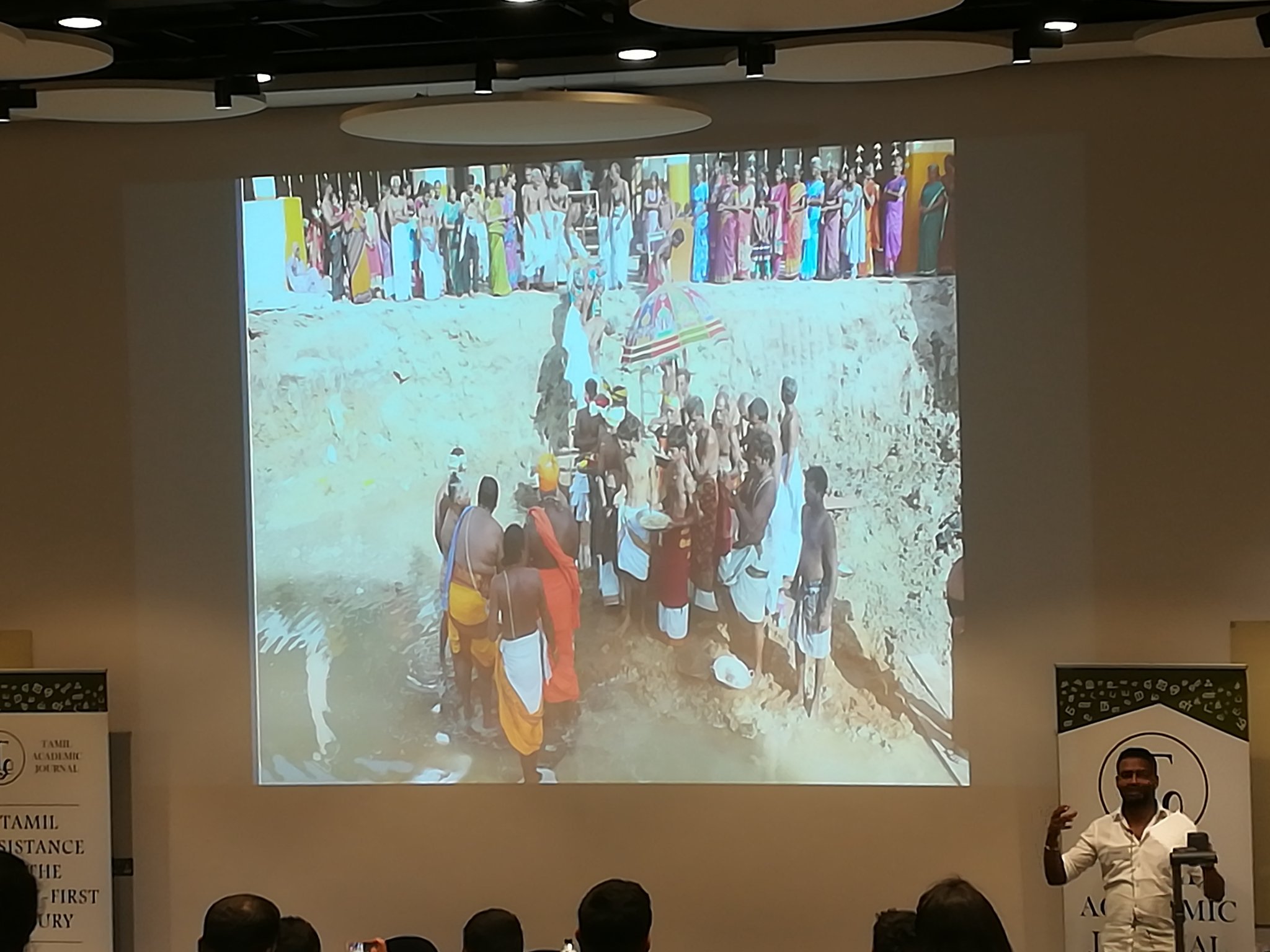
Thanges work focuses on the practice of caste in Jaffna breaking down the period into pre-war, during the war and post-war.
He notes for example that there were an increase and subsequent sharp decrease in intercaste marriages during and after the war. Interestingly he notes;
“B.R. Ambedkar had theorised that the growth of intercaste marriages would end the caste system but Thanges notes that the underlying political, economic and social structures stayed intact enabling it's survival”.
The final panel discussion was hosted by Dr Rachel Seoighe, Mr Malcolm Rodgers, Mr. Yathavan Thanapalan, S Rajkumar and discussed the future of the academic journal.
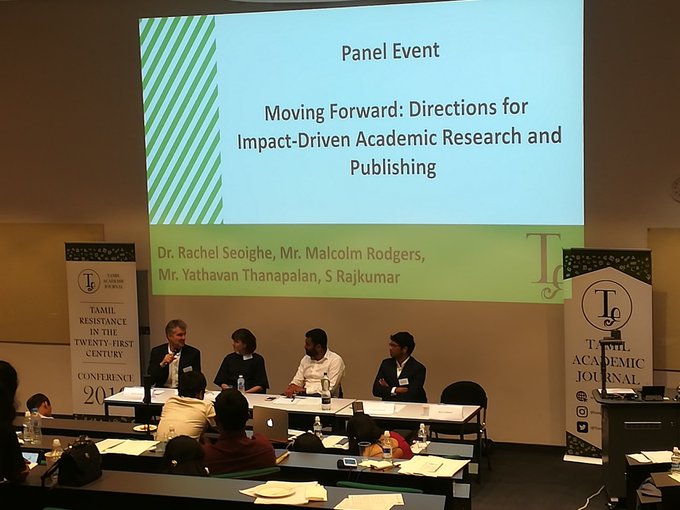
Read more here.
We need your support
Sri Lanka is one of the most dangerous places in the world to be a journalist. Tamil journalists are particularly at threat, with at least 41 media workers known to have been killed by the Sri Lankan state or its paramilitaries during and after the armed conflict.
Despite the risks, our team on the ground remain committed to providing detailed and accurate reporting of developments in the Tamil homeland, across the island and around the world, as well as providing expert analysis and insight from the Tamil point of view
We need your support in keeping our journalism going. Support our work today.
For more ways to donate visit https://donate.tamilguardian.com.

